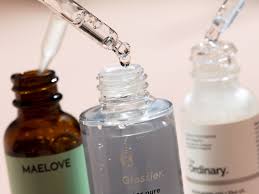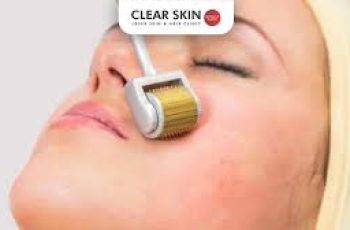QQ: Can I Use Niacinamide for Acne?
Niacinamide, also known as vitamin B3, is one of the most popular ingredients in skincare and is often considered a “must-have” in TikTok skincare routines. And for good reason: The brightener can help eliminate dark spots and redness while reducing the appearance of fine lines and wrinkles. 1
But is this popular ingredient good for acne? We asked board-certified dermatologists Marisa Garshick, MD, and Jessie Cheung, MD, to give us the latest on niacinamide for acne. Read her thoughts below.
What is Niacinamide?
“Niacinamide, also known as vitamin B3, is a water-soluble vitamin that has many different benefits for the skin,” explains Garshick. “Niacinamide has become increasingly popular because it’s a versatile ingredient that is a great choice in its own right to address skin care concerns like discoloration and redness while being gentle on the skin.”
The ingredient promotes the production of ceramides in the skin; this is essential for maintaining barrier function. This barrier helps keep the skin hydrated and protected from environmental stressors like pollution and UV radiation. Additionally, niacinamide has anti-inflammatory properties that can soothe skin redness and irritation. 2
Does it work for acne?
Yes, niacinamide can help treat acne, Cheung tells us. “Niacinamide can treat acne and balance oil production while shrinking pores,” she explains. “Niacinamide can help even out skin tone and improve the appearance of hyperpigmentation and dark spots,” Garshick adds.
Incorporate into your routine
If you’re considering adding niacinamide to your skincare routine, there are a few things you should keep in mind. Here are some tips to get you started:
Patch test: Before using a new product or ingredient, it’s always a good idea to test it on a small area of your skin. Here’s how to find out if you’re allergic or sensitive to niacinamide.
Start with a small dose: If your skin is sensitive to niacinamide, Cheung recommends starting with a lower concentration. “The safest level is between 2% and 5%, and even up to 10% if your skin can tolerate it,” she explains.
Choose the right product: Niacinamide is found in a variety of skincare products, including serums, moisturizers, toners, and even spot treatments. Consider your skin type and specific concerns when choosing the most appropriate formula.
Don’t overdo it: More isn’t always better. Using more niacinamide than you need won’t necessarily yield faster or better results. Stick to the recommended usage and give the ingredient time to work its magic.
Be patient: As with any ingredient in skincare, results may not be immediately apparent. Give yourself some time to notice changes in your skin, as results can vary based on individual factors. Consistency is key.
When it comes to products, Garshick has a few favorites. “TruSkin Niacinamide Serum improves discoloration without irritating the skin. It doesn’t leave you feeling greasy,” she tells us. “MaeLove’s NIA 10 Serum is especially good for those with sensitive, inflamed, dry, or acne-prone skin. This soothing serum contains niacinamide (vitamin B3), zinc, and white tea extract to help reduce redness and soothe skin.” Chenug likes ISDIN’s Melaclear Advanced, which “combines niacinamide with tranexamic acid and licorice root extract to target unwanted dark spots, including treating melasma.”
Potential Side Effects and Precautions
Before adding niacinamide to the mix, be aware of the other ingredients in your routine. “Avoid using niacinamide and AHAs or BHAs at the same time, as niacinamide’s high pH can interfere with the absorption of these acids,” says Cheung. However, there are many ingredients that work well with niacinamide. “It can be combined with ingredients like kojic acid, arbutin, or tranexamic acid to support pigmentation, or with other ingredients commonly found in moisturizers, such as ceramides and hyaluronic acid,” Garshick tells us.
As mentioned above, higher concentrations of niacinamide can cause sensitivity or irritation.
Conclusion
Niacinamide is a form of vitamin B3 that has many benefits for the skin, including reducing the appearance of acne and acne scars. If you’re looking for an easy way to improve the health and appearance of acne-prone skin, consider incorporating niacinamide into your daily routine. This multifunctional ingredient has powerful brightening and protective benefits, making it a valuable addition to many daily regimens.
DQH Can I use salicylic acid first and then vitamin C?
It’s easy to create a skincare routine, but knowing how to use it is another thing entirely. In most cases, if you’re not getting the desired skin results, it could be due to the layering of conflicting ingredients. So, is it possible that salicylic acid and vitamin C are such ingredients? Or are these active ingredients the duo that’s been missing from your skincare routine? If you want answers, stick around because today we are going to explain the benefits of salicylic acid and vitamin C and how they can be used in your daily life.
What are the benefits of salicylic acid for skin?
Salicylic acid is one of the most commonly used beta hydroxy acids and is favored by many people with oily, acne-prone skin. This acid is derived from willow bark, and unlike its water-soluble relatives (called alpha-hydroxy acids), salicylic acid is oil-soluble, which means it can penetrate deeper into the lower layers of the skin. Once it reaches the lower layers, it can help unclog pores of excess sebum, dirt, bacteria, debris, and impurities. This results in clearer skin tones and greater definition.
Not only does salicylic acid benefit the underlying layers, but the outer surface of the skin benefits as well. When applied to the skin, salicylic acid removes the buildup of dead skin cells. This is accomplished by breaking the bonds that hold dead cells to the surface. Over time, this can cause the complexion to look dull and prone to acne, blackheads, and other blemishes.
If you’d like to learn more about salicylic acid and how it can improve your skin, check out this dedicated blog post from a beauty insider.
What are the benefits of vitamin C for skin?
Vitamin C is considered one of the most powerful antioxidants, which means it is very effective at fighting free radicals and preventing them from causing further skin damage. Examples of free radicals include pollution, central heating, UV rays and harsh climate. They attack proteins, fats and cell membranes as soon as they come into contact with the skin, causing signs of premature aging such as fine lines and wrinkles as well as hyperpigmentation, flaky patches of skin and loss of elasticity.
Many people usually prefer to use vitamin C in their morning routine as this ingredient gives the complexion a radiant glow. You’ll also find that vitamin C can target areas of hyperpigmentation, plumping the skin and reducing the appearance of fine lines and wrinkles.
The thing about vitamin C is that there are a lot of outdated studies going back to the 1950s that describe vitamin C as an unstable skin component. Thanks to improvements in modern technology, this is no longer the case as all products now contain a stable form of vitamin C.
Visit The Beauty Insider to learn more about vitamin C. So please check out our blog post.
Can I use salicylic acid first and then vitamin C?
Yes, you absolutely can. In fact, it’s thought that using salicylic acid before using vitamin C ensures it penetrates faster and works faster.
This is an efficient way to utilize two power sources, and the reason has to do with pH. For example, the skin’s natural pH is about 4.7, making it slightly acidic. Salicylic acid and vitamin C are also both acidic, and you’ll find that vitamin C is absorbed quickly into the skin. Therefore, using salicylic acid beforehand can increase the acidity of the skin and allow vitamin C to penetrate into the skin faster.
While this is considered an effective way to combine two powerful ingredients, you need to be aware of your skin type and how it reacts to certain active ingredients. Even people with perfect, normal skin can experience skin sensitivity and irritation. Therefore, always consult a doctor or dermatologist before using any new products on your skin.
It’s also important to follow skin application rules. In this case, you need to use the product correctly to ensure you get the best results for your skin. If you’re not sure what I mean, the basic rule for skin is to start with the thinnest consistency and work your way up to the thickest consistency. This prevents a barrier from forming on the surface, preventing other active ingredients from penetrating the skin.
Can I use salicylic acid at night and vitamin C in the morning?
Yes, absolutely, this is considered the most effective way to get returns without any adverse side effects. This is because there is enough time between applications to ensure that the skin’s pH levels return to balance.
You’ll also find that Vitamin C is rich in antioxidants and is perfect for use in the morning to ensure your skin is protected and looking its healthiest. Due to the small size of salicylic acid molecules, it is an acid that is able to reach the deepest parts of the skin. While this is effective at keeping skin clear, it also increases the risk of irritation and photosensitivity. Therefore, many people prefer to use powerful BHAs in their evening routine without exposure to UV rays, pollution, or harsh weather.
Warning: If you avoid using sunscreen every day, none of these ingredients will do what your skin needs. The combination of chemical peels and powerful ingredients increases the risk of further damage to the skin’s surface. Use SPF 50 every day to keep your skin protected and your lipid barrier healthy, even on cloudy days, keeping your skin in top condition.



